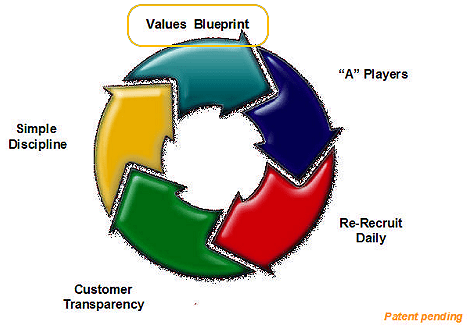Principle One: The Five Step Model- Defining the Values Your Organization Will Live By.
Values are the heartbeat of the organization. For some companies values seem unnoticed because there is nothing special about them and little attention has been put on them. For other companies, values have become a strategic weapon that distinguishes them from competitors and that customers notice and prefer. (Starbucks, Southwest, Zappos). Like it or not your organization has values which have been instilled and driven home (intentionally or not) by the behaviors and decision making of your leaders.
There is truth in the saying, “People don’t listen to you speak: They watch your feet”
The behavior of leaders determines the corporate culture. You could say that values and behavior are synonymous because a real value, one that has meaning, is noticeable and observable. In some organizations, values exist that may not have been consciously directed. Values may never have been communicated in an employee handbook, but people understand that the organization behaves in a certain way.
The first step in creating a values-centric culture is to commit to defining values and then leading with the values. You must establish a systematic process for defining and managing by values. Unless time is set aside to be intentional in the values forming process it is likely your corporate culture will reflect the values of your most significant leaders and even form sub-cultures by department. Creating a Values Blueprint ™ is an important part of the process and includes establishing a set of behaviors for each value. The Values Blueprint ™ then provides a foundation for hiring, rewarding, recognizing, and managing the performance of employees. The Key to creating a Values Blueprint ™ is defining them with behaviors.
Do you know where you values are today?






I believe we are driven by our beliefs. Knowing your beliefs is knowing your future.
Agree? Are beliefs like values?
Best regards, raf
Greetings Raf: Welcome.
In general , our belief about how things in an organization are done are based upon the behaviors of people within the company. Our values are what we say are important to us, yet there can be a big disconnect between what we proclaim our values to be and our actions and the actions of company management. For example, if our boss declares that he values open/honest communication yet does not demonstrate that, then people see from his actions what he values which creates a belief about the future. Yes, beliefs become expectations about the future and they are based upon behavior.
Our organizational leadership model says that leaders first define the values they wish to live be and then followup those values with behaviors to be followed by themselves and throughout the organization. If values are not lived they are empty words. Zappos (a unique US retailer) for example http://about.zappos.com/jobs/why-work-zappos/core-values defined the values they want to live by, and followed up by commiting to lead by those values and not just hang them on the wall. Their culture is intentional and not accidental. We go to Zappos and expect great customer service, that is our belief. The values that Zappos has defined has become a key strategic tool for their company and is now the belief from customers and employees about the future.